牛津译林版八年级下Unit 3 Online tours知识点归纳总结(72张PPT)
文档属性
| 名称 | 牛津译林版八年级下Unit 3 Online tours知识点归纳总结(72张PPT) |  | |
| 格式 | zip | ||
| 文件大小 | 653.3KB | ||
| 资源类型 | 教案 | ||
| 版本资源 | 牛津译林版 | ||
| 科目 | 英语 | ||
| 更新时间 | 2022-03-20 16:35:17 | ||
图片预览


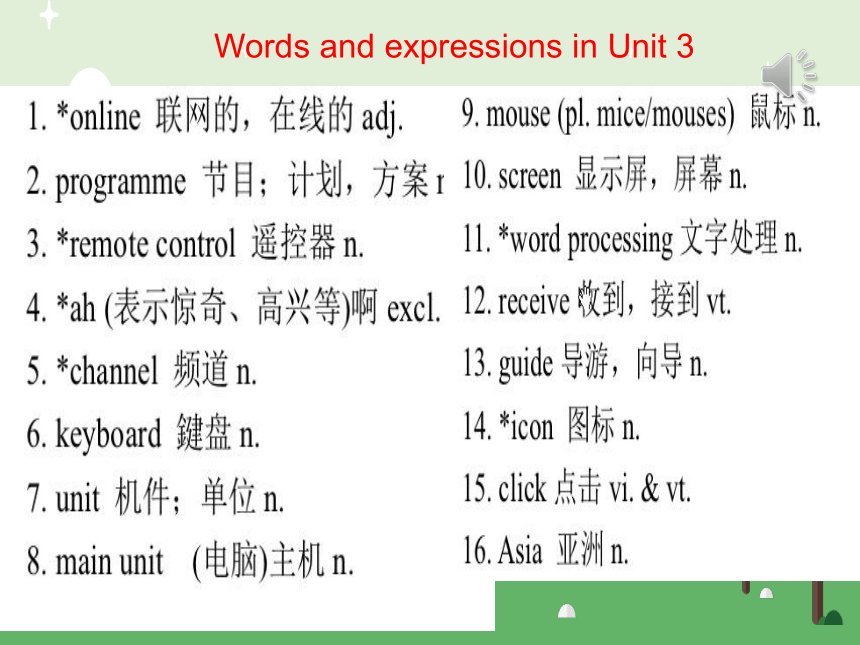

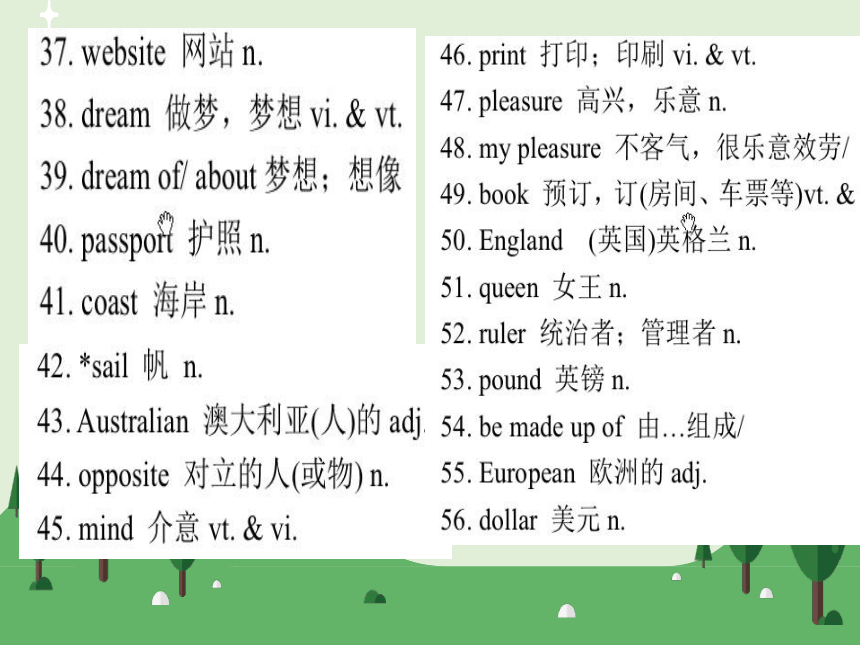
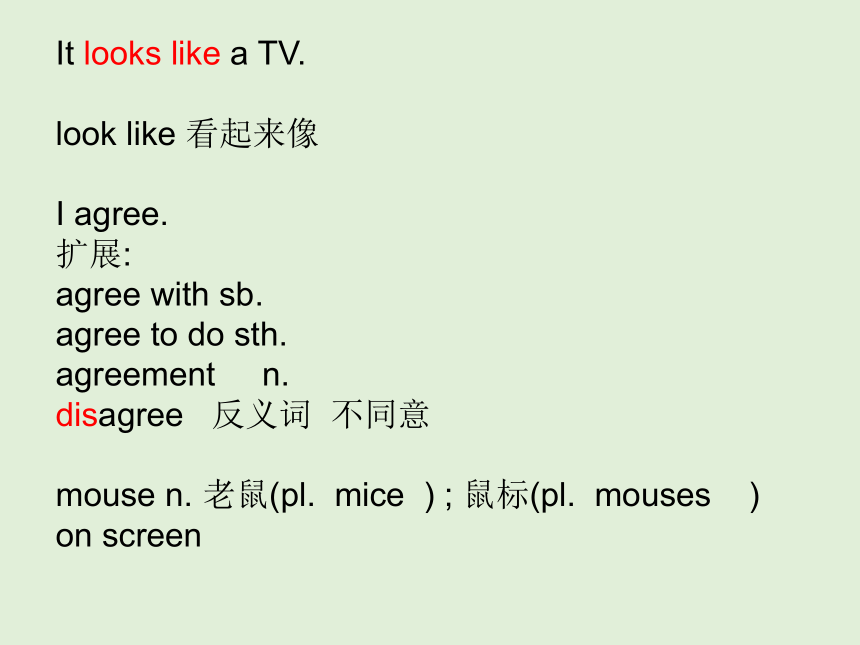
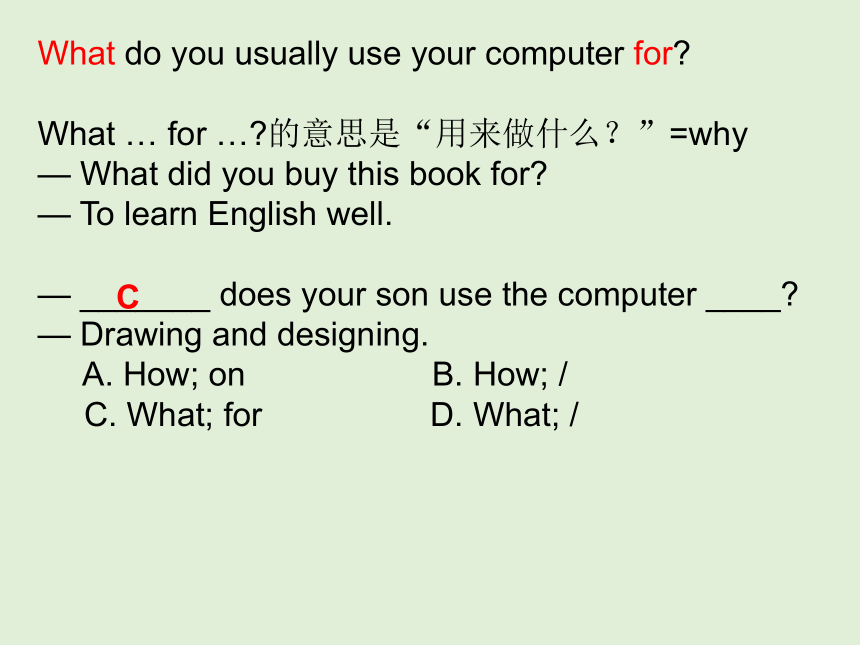
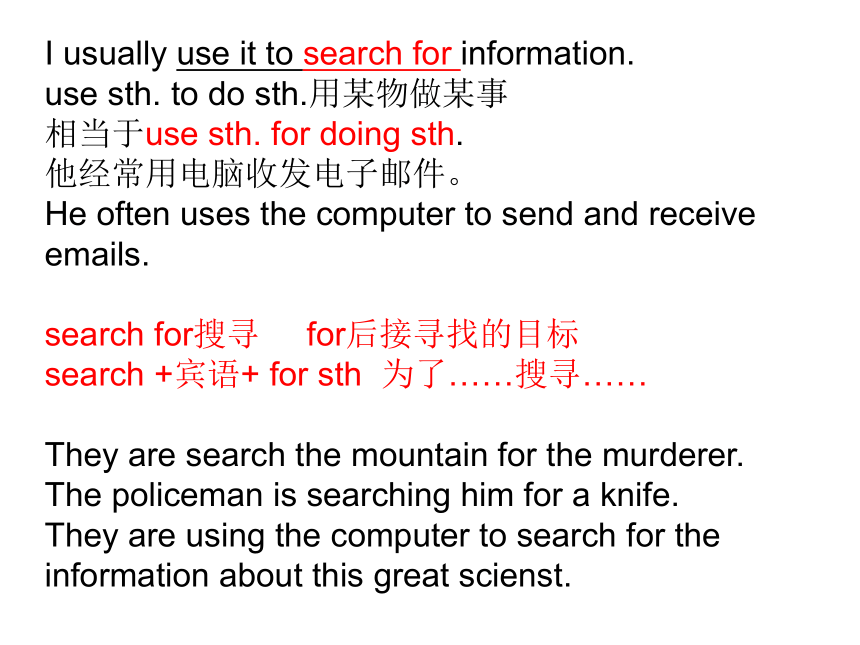
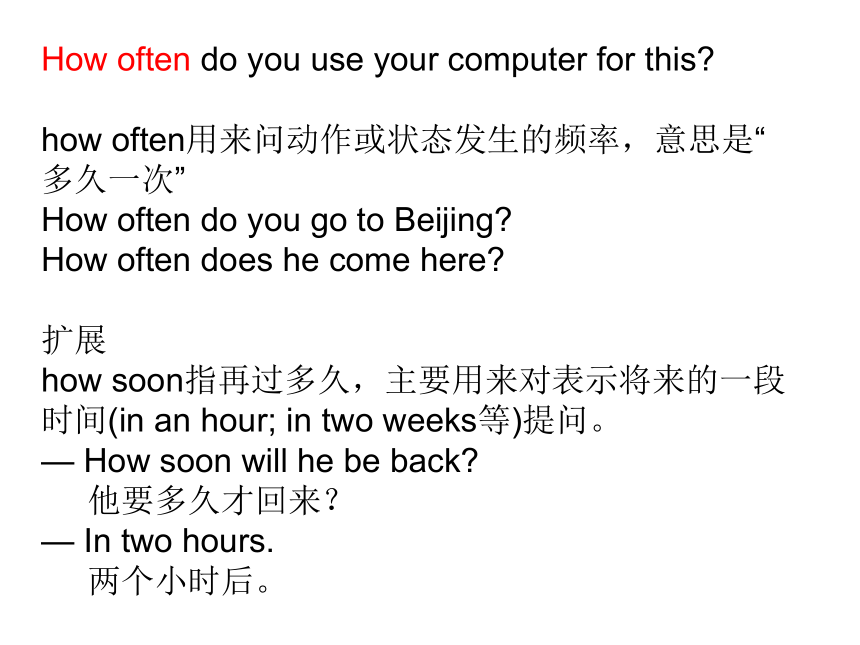
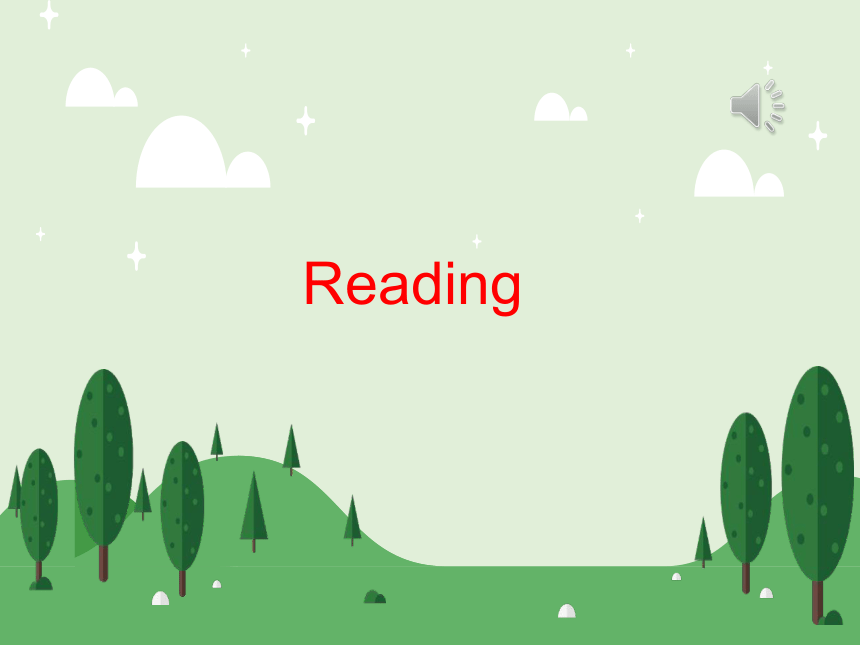
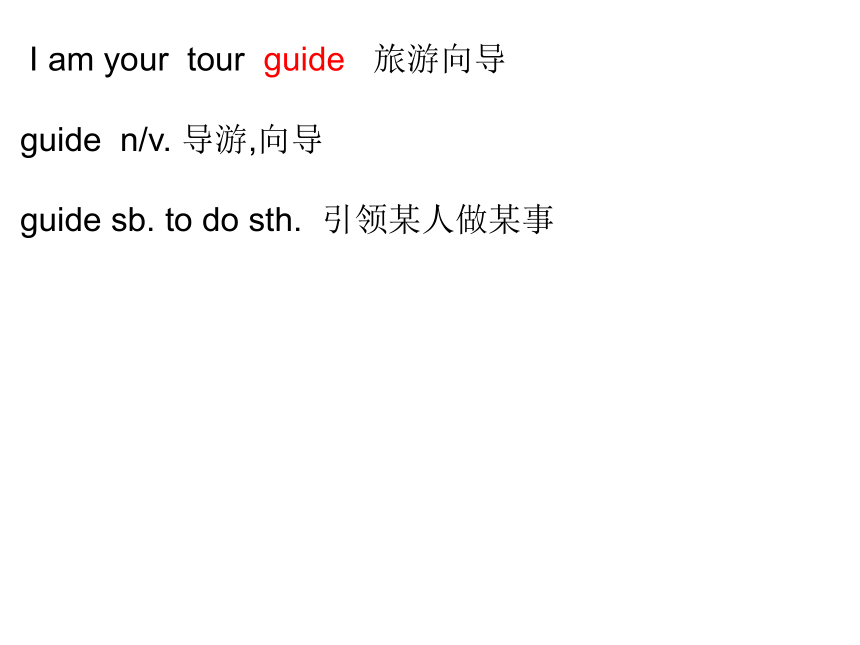
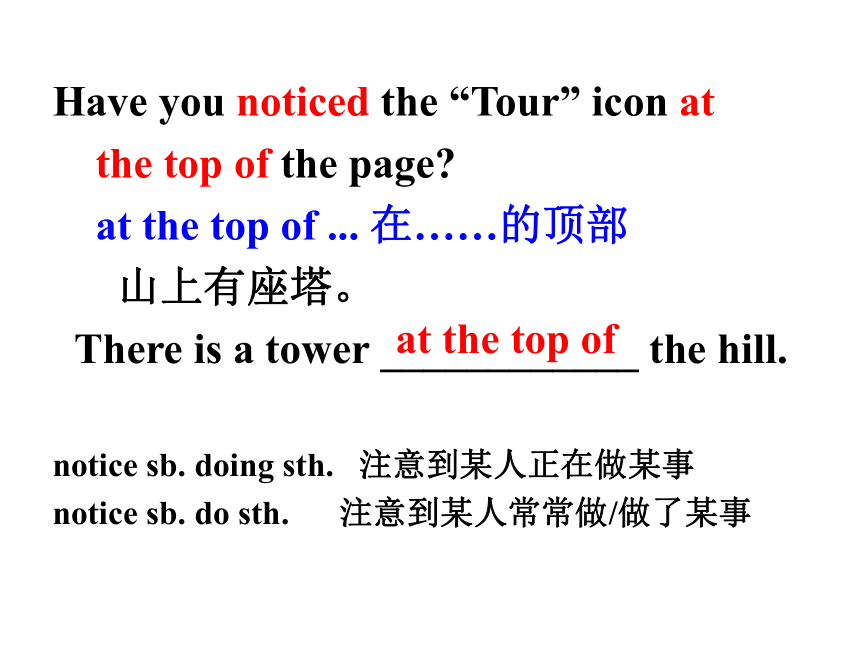
文档简介
(共72张PPT)
Unit 3
Online tours
Comic strip
Welcome to the unit
Words and expressions in Unit 3
It looks like a TV.
look like 看起来像
I agree.
扩展:
agree with sb.
agree to do sth.
agreement n.
disagree 反义词 不同意
mouse n. 老鼠(pl. mice ) ; 鼠标(pl. mouses )
on screen
What do you usually use your computer for
What … for … 的意思是“用来做什么?”=why
— What did you buy this book for
— To learn English well.
— _______ does your son use the computer ____
— Drawing and designing.
A. How; on B. How; /
C. What; for D. What; /
C
I usually use it to search for information.
use sth. to do sth.用某物做某事
相当于use sth. for doing sth.
他经常用电脑收发电子邮件。
He often uses the computer to send and receive emails.
search for搜寻 for后接寻找的目标
search +宾语+ for sth 为了……搜寻……
They are search the mountain for the murderer.
The policeman is searching him for a knife.
They are using the computer to search for the information about this great scienst.
How often do you use your computer for this
how often用来问动作或状态发生的频率,意思是“多久一次”
How often do you go to Beijing
How often does he come here
扩展
how soon指再过多久,主要用来对表示将来的一段时间(in an hour; in two weeks等)提问。
— How soon will he be back
他要多久才回来?
— In two hours.
两个小时后。
Reading
I am your tour guide 旅游向导
guide n/v. 导游,向导
guide sb. to do sth. 引领某人做某事
Have you noticed the “Tour” icon at
the top of the page
at the top of ... 在……的顶部
山上有座塔。
There is a tower ____________ the hill.
notice sb. doing sth. 注意到某人正在做某事
notice sb. do sth. 注意到某人常常做/做了某事
at the top of
Just click on it, and you can visit Asia, Africa,…
click on... 点击……
点击这个图标。
_________ this icon.
亚洲 Asia 亚洲人(复) Asians 非洲 Africa 非洲人(复) Africans
欧洲 Europe 欧洲人(复) Europeans 澳大利亚 Australia 澳大利亚人(复) Australians
德国 Germany 德国人(复) Germans
Click on
祈使句+ and +陈述句
祈使句+ or +陈述句
祈使句表示条件,相当于if条件状语从句。
如果祈使句表示肯定的条件,用and,如果祈使句表示否定的条件,用or。
Just click on it, and you can visit Asia, Africa,…
= If you click on it, you can visit Asia, ...
Hurry you up, or you will be late.
= If you don’t hurry up, you will be late.
Wall Street, the world-famous trade centre, is here at the southern end of Manhattan Island.
world-famous
世界著名的,举世闻名的
姚明是世界著名的篮球运动员。
Yao Ming is a ________________
basketball player.
world-famous
at the southern end of... 在……的南端
south (n.) + ern = southern(adj.)
以此类推:north+ern=northern
west+ern=western
east+ern=eastern
at the end of... 在……的尽头,末尾;
后接时间、地点名词。
这个月末 at the end of this month
在路的尽头 at the end of the road
nation n. 国家、民族
national (adj.)国家的、民族的
watch the raising of the national flag 观看国旗的升起。
International adj.国际的
an international organization
Further on is Times Square.
further on 更进一步,再向前
再向前一英里 a mile further on
further 是far的比较级,除了表示“更
远”以外,还可以表示“进一步”。
深造 further study
进一步的信息 further information
Every year, thousands of people gather
here on New Year’s Eve.(翻译常考)
1) gather vi. 聚集
医院门口聚集了很多人。
A lot of people ________ at the gate of
the hospital.
2) on New Year’s Eve 在新年前夕
在平安夜 on Christmas Eve
gathered
hundreds of数百
thousands of数千
thousands of students
注意:
hundred 和thousand前面加数词,表示具体的数量,无论前面的数词多大,hundred和thousand都不可以用复数。
nine thousand students
It’s exciting to see the huge glass ball
falling through the darkness.
1) It’s exciting to see ... 看到……很激动
It’s + adj. + to do sth. 做某事怎么样
对我来说按时完成这么多的工作很困 难。
It’s ____________ me _________ so
much work on time.
difficult for
to finish
2) see sb. doing 看见某人正在做某事
我刚才看见很多孩子在操场上打篮球。
I ______ many children _________
basketball on the playground just now.
saw playing
感官动词
see, watch, observe, notice, look at,
hear, listen to, smell, taste, feel
+ do 表示动作的完整性,真实性;
+doing 表示动作的连续性,进行性。
单击此处添加标题
I saw him work in the garden yesterday.
昨天我看见他在花园里干活了。(强调“我看见了”这个事实)
I saw him working in the garden
yesterday.(强调“我见他正干活”这个动作)
昨天我见他正在花园里干活。
3) through the darkness 穿过黑暗
through 意为“穿过”,通常指从物体或事物的“内部”穿过。
穿过隧道 through the tunnel
穿过雨林 through the rainforest
In the centre of the island is central park. With several lakes,hills and a large green lawn, it’s a good place to relax after a hard day’s work.
a hard day’s work 一天的辛苦工作
relax v. 放松 relaxed adj. 放松的
三单:relaxes relaxing adj.令人放松的
hard 的用法:
用作形容词 (adj.)
1) 表示“硬的” 例如:
The ground is as hard as stone after the long drought.
长期干旱之后,土地硬得就像石头一样。
2) 表示“困难的,艰难的” 例如:
It’s very hard to work out this maths problem.
算出这道数学题非常困难。
用作副词 (adv.)
1) 表示“努力地,勤奋地” 例如:
Most importantly, you must work hard to catch up.
最为重要的是,你必须努力学习,迎头赶上。
2) 表示“强烈地” 例如:
The wind is blowing hard outside.
外面风正呼呼地刮。
hardly
It has been famous for its theatres since
the early twentieth century.
1) be famous for 因……而著名
苏州因为它的园林而闻名。
Suzhou ______________ its gardens.
<辨析> 与be famous as 的区别
be famous as 作为……而著名
is famous for
island n
an island country 一个岛国
on the island 在岛上
several pron/adj
There are several lakes, hills.
_Several_of__ the members have come up with suggestions of their own 几位成员提出了自己的建议。
Several hundred students gathered on campus. 几百名学生聚集在校园里。
马克 吐温作为儿童故事作家而出名。
Mark Twin ___________ a children
story writer.
这个地区以产绿茶而著名。
This area ____________ its green tea.
is famous as
is famous for
2) since 自从……
(1). since +过去一个时间点
I have been here since 1989.
自从1989年以来我就在这里了。
(2). since +一段时间+ ago
I have been here since five months ago.
我五个月前就在这里了。
(3). since +从句
Great changes have taken place since you left.
自你离开后这里发生了巨大的变化。
(4). It is +一段时间+ since从句
It is two years since I became a middle school student.
我成为一名中学生已经快两年了。
Have you ever heard of the song
“Memory”
hear of 听说,得知。如:
Have you ever _________ him (this)
你听说过他(这件事)吗?
heard of
OK, so much for New York.
好的,关于纽约就讲这么多。
so much for sth.的意思是“(表示就某事讲完了)关于……就讲这么多,……到此为止”
So much for today’s class.
今天的课就讲这么多。
There’s a “Back” icon at the bottom
of the page.
at the bottom of 在……的底部 如:
寻找在列表底部的图标。
Look for the icon _______________
the listing.
at the bottom of
Click on it, pick another and then start your new tour.
点击它,挑选另一个城市,然后开始你的新旅程。
pick v. 挑选;采摘
It took her two hours to pick a dress that suited her.
她花了两个小时才挑选一条适合她的连衣裙。
Can you pick some flowers for the dinner table
你能采些花放在餐桌上么?
pick up拿起;捡起;(开车)接人
He picked up his knife and fork.
他拿起了刀叉。
pick out 挑选
Who will you pick out to represent the whole team
你 讲挑选谁代表全队?
musical:a play filled with many songs
filled with
Grammar
Simple past tense and
present perfect tense
一、构成不同
They lived here in 2011.
他们2011年住在这里。
We have lived here for three years.
我们已经在这里住了3年了。
一般过去时:主语 + 谓语动词的过去式
现在完成时:have/has + V-ed
现在完成时与一般过去时的区别
He visited Guilin in 1998.
他1998年参观过桂林。
She always swam in the sea when she lived in Qingdao.
她住在青岛的时候,总是去海里游泳。
Jill has bought a new computer.
吉尔买了一台新电脑。
I have had my lunch.
我已经吃了午餐。
二、用法不同
一般过去时表示过去某个时间发生的事、存在的状态或经常发生的动作。说话的侧重点只在于陈述一件过去的事情,不强调对“现在”产生的影响。
现在完成时表示的动作或状态与现在的情况有联系,侧重这一动作对现在所造成的影响。
He has read that book.
(说明他现在知道那本书的内容。)
He read that book last year.
(只说明他去年读过那本书。 )
He has gone to America.
(他现在不在此地, 到美国去了。)
He went to America.
(只说明他去过美国。)
三、时间状语不同
Did you watch that film last week
你上周看那部电影了吗?
She came back yesterday.
她是昨天回来的。
His father has been a teacher since 1968.
他父亲从1968年以来一直当老师。
— Have you ever been to London
— No, I have never been there.
— 你曾经去过伦敦吗?
— 没有,以前从没去过。
一般过去时通常与表示过去的具体的时间状语连用。如:yesterday, last week, two years ago, just now, in 2002等;而现在完成时则常与表示不确切的时间副词连用,如already, yet,
ever, never, just, since, for等。
1. Paul and I ______ tennis yesterday. He
did much better than I.
A. play B. will play
C. played D. are playing
2. Mr. Black is going to marry a girl he
______ in Japan last year.
A. meets B. met
C. has met D. would meet
I. 单项选择。
3. — Have you ever been to Canada
— Yes, I ______ there last year with
my parents.
A. have been B. have gone
C. went D. go
4. My aunt is a writer. She ______ more
than ten books since 1980.
A. writes B. wrote
C. has written D. will write
5. How time flies! Several years ______
since we started our middle school life.
We will keep the pleasant experiences
in our minds.
A. have pass B. has passed
C. will pass
6. — Where were you last Saturday
— I _______ in the Capital Museum.
A. am B. will be
C. was D. have been
7. I have been to Shanghai. I _______
there last month.
A. go B. went
C. have gone D. will go
8. — What did you do last night
— I _______ TV and read books.
A. watch B. watched
C. have watched
9. He _______ for ten years.
A. has been married B. married
C. got married
D. has married
10. Julie's father ______ to London last
month. He ______ there three times.
A. went; had gone
B. has gone; has been
C. went; has been
D. has been; had gone
Translation
1. 几天前我在街上遇见了一位老朋友。
2. 我已经很久没有看电影了。
3. 我希望有一天能去欧洲游览。
I met an old friend in the street the other day.
I haven’t seen a movie for a long time.
I hope I can visit Europe some day.
4. 你有没有曾经梦想过不用护照环游世界?
5. 你真幸运!我还从未去过香港。
Have you ever dreamt of travelling around the world without a passport
Lucky you! I have never been to Hong Kong.
dream v. --- dreamed / dreamt --- dreamed/ dreamt
dream of / about doing (do) sth.
dream to do sth
Have you dreamt (dream) of travelling (travel) around the world without a passport
我已经实现了我的梦想。
I have realized my dream. =My dream has come true .
daydream n白日梦 vt做白日梦 stop__daydreaming___别做白日梦了!
Integrated skills
Sydney is on the north-east coast of Australia.
on the north-east coast of Australia
位于澳大利亚的东北海岸
太平洋位于北美洲的东海岸。
The Pacific Ocean is ________________ North America.
on the east coast of
The Sydney Opera House looks like a ship with many sails.
a ship with many sails
一艘有很多帆的船
此处 with 表示“带有或拥有”
白宫是一个带有大花园的美丽建筑。
The White House is a beautiful building with a big garden.
Australian seasons are the opposite of ours.
the opposite of 与……相反/相对
他们的观点与我们的相反。
Their ideas _______________ ours.
are opposite of
Would you mind showing me how to start this online tour
句型 Would you mind ... 可用于客气 地请人做某事。
Would you mind explaining the sentence again
你再解释一下这句话行吗?
mind doing sth. 介意做某事
你介意帮我搬这张书桌吗?
Do you ____________ me carry the desk
mind one’s doing sth. 介意某人做某事
你介意我在这儿抽烟吗?
Do you ________________ here
mind helping
mind my smoking
回答Would /Do you mind (not) doing sth.时,要注意yes和no都是针对mind。表示“介意,在乎”时用yes,后跟句子,意思是不让对方做某事,表示“不介意,不在乎”时,用no,后跟句子,表示允许某人做某事。通常如果介意就用“Yes, you’d better…”来回答;如果不介意就用“Of course not.”、“Certainly not.”或“Not at all.”等回答。
— Would you mind my smoking here
— You’d better not.
— Would you mind working in the countryside
— ___________. I will be glad to work there.
A. Of course not B. I’m afraid so
C. I don’t think so D. You’d better not
A
— Thanks for your help, Millie.
— My pleasure.
My pleasure. = It’s my pleasure.
当别人感谢你时,你用来回答。意思是“不客气;很乐意效劳。”
— Thank you for helping me cleaning the floor.
— My pleasure./ It’s my pleasure.
当别人请求你做某事时,可以用with pleasure来回答。with pleasure的意思是“很高兴;很乐意;十分愿意”。
— Will you give me a hand 请你帮我一下好吗?
— With pleasure.
可以这样理解:with pleasure常用作做某事之前,而my pleasure常用在做某事之后。
Task
It is made up of England, Scotland, Wales and Northern Ireland.
be made up of 由……组成/构成
生活是由琐事构成的。
Life is ___________ little things.
[拓展]
be made of 由……制成(看得出原材料)
be made from 由……制成(看不出原材料)
be made in 在某地制造
made up of
It has been the home of kings and queens for a long time.
be the home of ... 是/成为……的家
自然保护区已经成为了很多罕见的鸟的家。
Nature reserves
_________________ of many
rare birds.
have been the home
The UK has always been famous for its museums.
be famous for意为“因为……而出名”。当主语是人时,常表示以某种技能或特征而出名;当主语是地点名词时,常表示以某个名胜古迹或特产而出名。
伦敦因大本钟而著名。
London is ___________ Big Ben.
famous for
[拓展]
be famous as 意为“作为……而出名”。当主语是人时,常表示以某个身份而出名;当主语是地点名词时,常表示作为某种东西的产地而出名。如:
His uncle is famous as an actor.
This area is famous as a green tea producing place.
根据句意选用for或as填空。
1) George is famous ________ a writer.
2) France is famous ________ its wine and food.
for
as
The best time to visit the UK is from May to September because its winter is wet and cold.
句中的to visit the UK是动词不定式短语作后置定语。
The best time to travel in the city is in May.
the best time to do sth. 做......最好的时间
春天是放风筝最好的时间。
Spring is the _____________ kites.
best time to fly
It is sunny one minute, but rainy the next, so prepare for it before you go there.
prepare 用作动词,意为“准备”,后面常跟名词、代词、不定式作宾语。prepare还常与for搭配构成短语prepare for, 表示“为……作准备”。
期末考试要到了, 你最好做好准备。
The final exam is coming. You’d
better _____________it.
prepare for
Translation.
1. 我们班有15个男生和12个女生。
Our class is made up of 15 boys and 12 girls.
2. 白金汉宫已经成为国王和女王的家很久 了。
Buckingham Palace has been the home of kings and queens for a long time.
4. 这一分钟是晴朗的,下一分钟就会有雨。
It is sunny one minute, but rainy the next.
5. 春天和秋天是旅游的最好时间,因为既不
太热也不太冷。
The best time to go travelling is spring and autumn, because it is not too hot or too cold.
3. 英国还有很多自然美景的地方。
The UK also has many places of natural beauty.
5. 她住在这个城市的南端。
She lives ___________________ the city.
6. 对汤姆来说早起是不可能的。
It’s __________ for Tom ________
early.
7. 今天的课到此结束。
______________ today’s lesson.
8. 从1970年开始我爷爷就住在这里了。
My grandfather _________ here _____
1970.
at the southern end of
impossible
to get up
So much for
has lived
since
Unit 3
Online tours
Comic strip
Welcome to the unit
Words and expressions in Unit 3
It looks like a TV.
look like 看起来像
I agree.
扩展:
agree with sb.
agree to do sth.
agreement n.
disagree 反义词 不同意
mouse n. 老鼠(pl. mice ) ; 鼠标(pl. mouses )
on screen
What do you usually use your computer for
What … for … 的意思是“用来做什么?”=why
— What did you buy this book for
— To learn English well.
— _______ does your son use the computer ____
— Drawing and designing.
A. How; on B. How; /
C. What; for D. What; /
C
I usually use it to search for information.
use sth. to do sth.用某物做某事
相当于use sth. for doing sth.
他经常用电脑收发电子邮件。
He often uses the computer to send and receive emails.
search for搜寻 for后接寻找的目标
search +宾语+ for sth 为了……搜寻……
They are search the mountain for the murderer.
The policeman is searching him for a knife.
They are using the computer to search for the information about this great scienst.
How often do you use your computer for this
how often用来问动作或状态发生的频率,意思是“多久一次”
How often do you go to Beijing
How often does he come here
扩展
how soon指再过多久,主要用来对表示将来的一段时间(in an hour; in two weeks等)提问。
— How soon will he be back
他要多久才回来?
— In two hours.
两个小时后。
Reading
I am your tour guide 旅游向导
guide n/v. 导游,向导
guide sb. to do sth. 引领某人做某事
Have you noticed the “Tour” icon at
the top of the page
at the top of ... 在……的顶部
山上有座塔。
There is a tower ____________ the hill.
notice sb. doing sth. 注意到某人正在做某事
notice sb. do sth. 注意到某人常常做/做了某事
at the top of
Just click on it, and you can visit Asia, Africa,…
click on... 点击……
点击这个图标。
_________ this icon.
亚洲 Asia 亚洲人(复) Asians 非洲 Africa 非洲人(复) Africans
欧洲 Europe 欧洲人(复) Europeans 澳大利亚 Australia 澳大利亚人(复) Australians
德国 Germany 德国人(复) Germans
Click on
祈使句+ and +陈述句
祈使句+ or +陈述句
祈使句表示条件,相当于if条件状语从句。
如果祈使句表示肯定的条件,用and,如果祈使句表示否定的条件,用or。
Just click on it, and you can visit Asia, Africa,…
= If you click on it, you can visit Asia, ...
Hurry you up, or you will be late.
= If you don’t hurry up, you will be late.
Wall Street, the world-famous trade centre, is here at the southern end of Manhattan Island.
world-famous
世界著名的,举世闻名的
姚明是世界著名的篮球运动员。
Yao Ming is a ________________
basketball player.
world-famous
at the southern end of... 在……的南端
south (n.) + ern = southern(adj.)
以此类推:north+ern=northern
west+ern=western
east+ern=eastern
at the end of... 在……的尽头,末尾;
后接时间、地点名词。
这个月末 at the end of this month
在路的尽头 at the end of the road
nation n. 国家、民族
national (adj.)国家的、民族的
watch the raising of the national flag 观看国旗的升起。
International adj.国际的
an international organization
Further on is Times Square.
further on 更进一步,再向前
再向前一英里 a mile further on
further 是far的比较级,除了表示“更
远”以外,还可以表示“进一步”。
深造 further study
进一步的信息 further information
Every year, thousands of people gather
here on New Year’s Eve.(翻译常考)
1) gather vi. 聚集
医院门口聚集了很多人。
A lot of people ________ at the gate of
the hospital.
2) on New Year’s Eve 在新年前夕
在平安夜 on Christmas Eve
gathered
hundreds of数百
thousands of数千
thousands of students
注意:
hundred 和thousand前面加数词,表示具体的数量,无论前面的数词多大,hundred和thousand都不可以用复数。
nine thousand students
It’s exciting to see the huge glass ball
falling through the darkness.
1) It’s exciting to see ... 看到……很激动
It’s + adj. + to do sth. 做某事怎么样
对我来说按时完成这么多的工作很困 难。
It’s ____________ me _________ so
much work on time.
difficult for
to finish
2) see sb. doing 看见某人正在做某事
我刚才看见很多孩子在操场上打篮球。
I ______ many children _________
basketball on the playground just now.
saw playing
感官动词
see, watch, observe, notice, look at,
hear, listen to, smell, taste, feel
+ do 表示动作的完整性,真实性;
+doing 表示动作的连续性,进行性。
单击此处添加标题
I saw him work in the garden yesterday.
昨天我看见他在花园里干活了。(强调“我看见了”这个事实)
I saw him working in the garden
yesterday.(强调“我见他正干活”这个动作)
昨天我见他正在花园里干活。
3) through the darkness 穿过黑暗
through 意为“穿过”,通常指从物体或事物的“内部”穿过。
穿过隧道 through the tunnel
穿过雨林 through the rainforest
In the centre of the island is central park. With several lakes,hills and a large green lawn, it’s a good place to relax after a hard day’s work.
a hard day’s work 一天的辛苦工作
relax v. 放松 relaxed adj. 放松的
三单:relaxes relaxing adj.令人放松的
hard 的用法:
用作形容词 (adj.)
1) 表示“硬的” 例如:
The ground is as hard as stone after the long drought.
长期干旱之后,土地硬得就像石头一样。
2) 表示“困难的,艰难的” 例如:
It’s very hard to work out this maths problem.
算出这道数学题非常困难。
用作副词 (adv.)
1) 表示“努力地,勤奋地” 例如:
Most importantly, you must work hard to catch up.
最为重要的是,你必须努力学习,迎头赶上。
2) 表示“强烈地” 例如:
The wind is blowing hard outside.
外面风正呼呼地刮。
hardly
It has been famous for its theatres since
the early twentieth century.
1) be famous for 因……而著名
苏州因为它的园林而闻名。
Suzhou ______________ its gardens.
<辨析> 与be famous as 的区别
be famous as 作为……而著名
is famous for
island n
an island country 一个岛国
on the island 在岛上
several pron/adj
There are several lakes, hills.
_Several_of__ the members have come up with suggestions of their own 几位成员提出了自己的建议。
Several hundred students gathered on campus. 几百名学生聚集在校园里。
马克 吐温作为儿童故事作家而出名。
Mark Twin ___________ a children
story writer.
这个地区以产绿茶而著名。
This area ____________ its green tea.
is famous as
is famous for
2) since 自从……
(1). since +过去一个时间点
I have been here since 1989.
自从1989年以来我就在这里了。
(2). since +一段时间+ ago
I have been here since five months ago.
我五个月前就在这里了。
(3). since +从句
Great changes have taken place since you left.
自你离开后这里发生了巨大的变化。
(4). It is +一段时间+ since从句
It is two years since I became a middle school student.
我成为一名中学生已经快两年了。
Have you ever heard of the song
“Memory”
hear of 听说,得知。如:
Have you ever _________ him (this)
你听说过他(这件事)吗?
heard of
OK, so much for New York.
好的,关于纽约就讲这么多。
so much for sth.的意思是“(表示就某事讲完了)关于……就讲这么多,……到此为止”
So much for today’s class.
今天的课就讲这么多。
There’s a “Back” icon at the bottom
of the page.
at the bottom of 在……的底部 如:
寻找在列表底部的图标。
Look for the icon _______________
the listing.
at the bottom of
Click on it, pick another and then start your new tour.
点击它,挑选另一个城市,然后开始你的新旅程。
pick v. 挑选;采摘
It took her two hours to pick a dress that suited her.
她花了两个小时才挑选一条适合她的连衣裙。
Can you pick some flowers for the dinner table
你能采些花放在餐桌上么?
pick up拿起;捡起;(开车)接人
He picked up his knife and fork.
他拿起了刀叉。
pick out 挑选
Who will you pick out to represent the whole team
你 讲挑选谁代表全队?
musical:a play filled with many songs
filled with
Grammar
Simple past tense and
present perfect tense
一、构成不同
They lived here in 2011.
他们2011年住在这里。
We have lived here for three years.
我们已经在这里住了3年了。
一般过去时:主语 + 谓语动词的过去式
现在完成时:have/has + V-ed
现在完成时与一般过去时的区别
He visited Guilin in 1998.
他1998年参观过桂林。
She always swam in the sea when she lived in Qingdao.
她住在青岛的时候,总是去海里游泳。
Jill has bought a new computer.
吉尔买了一台新电脑。
I have had my lunch.
我已经吃了午餐。
二、用法不同
一般过去时表示过去某个时间发生的事、存在的状态或经常发生的动作。说话的侧重点只在于陈述一件过去的事情,不强调对“现在”产生的影响。
现在完成时表示的动作或状态与现在的情况有联系,侧重这一动作对现在所造成的影响。
He has read that book.
(说明他现在知道那本书的内容。)
He read that book last year.
(只说明他去年读过那本书。 )
He has gone to America.
(他现在不在此地, 到美国去了。)
He went to America.
(只说明他去过美国。)
三、时间状语不同
Did you watch that film last week
你上周看那部电影了吗?
She came back yesterday.
她是昨天回来的。
His father has been a teacher since 1968.
他父亲从1968年以来一直当老师。
— Have you ever been to London
— No, I have never been there.
— 你曾经去过伦敦吗?
— 没有,以前从没去过。
一般过去时通常与表示过去的具体的时间状语连用。如:yesterday, last week, two years ago, just now, in 2002等;而现在完成时则常与表示不确切的时间副词连用,如already, yet,
ever, never, just, since, for等。
1. Paul and I ______ tennis yesterday. He
did much better than I.
A. play B. will play
C. played D. are playing
2. Mr. Black is going to marry a girl he
______ in Japan last year.
A. meets B. met
C. has met D. would meet
I. 单项选择。
3. — Have you ever been to Canada
— Yes, I ______ there last year with
my parents.
A. have been B. have gone
C. went D. go
4. My aunt is a writer. She ______ more
than ten books since 1980.
A. writes B. wrote
C. has written D. will write
5. How time flies! Several years ______
since we started our middle school life.
We will keep the pleasant experiences
in our minds.
A. have pass B. has passed
C. will pass
6. — Where were you last Saturday
— I _______ in the Capital Museum.
A. am B. will be
C. was D. have been
7. I have been to Shanghai. I _______
there last month.
A. go B. went
C. have gone D. will go
8. — What did you do last night
— I _______ TV and read books.
A. watch B. watched
C. have watched
9. He _______ for ten years.
A. has been married B. married
C. got married
D. has married
10. Julie's father ______ to London last
month. He ______ there three times.
A. went; had gone
B. has gone; has been
C. went; has been
D. has been; had gone
Translation
1. 几天前我在街上遇见了一位老朋友。
2. 我已经很久没有看电影了。
3. 我希望有一天能去欧洲游览。
I met an old friend in the street the other day.
I haven’t seen a movie for a long time.
I hope I can visit Europe some day.
4. 你有没有曾经梦想过不用护照环游世界?
5. 你真幸运!我还从未去过香港。
Have you ever dreamt of travelling around the world without a passport
Lucky you! I have never been to Hong Kong.
dream v. --- dreamed / dreamt --- dreamed/ dreamt
dream of / about doing (do) sth.
dream to do sth
Have you dreamt (dream) of travelling (travel) around the world without a passport
我已经实现了我的梦想。
I have realized my dream. =My dream has come true .
daydream n白日梦 vt做白日梦 stop__daydreaming___别做白日梦了!
Integrated skills
Sydney is on the north-east coast of Australia.
on the north-east coast of Australia
位于澳大利亚的东北海岸
太平洋位于北美洲的东海岸。
The Pacific Ocean is ________________ North America.
on the east coast of
The Sydney Opera House looks like a ship with many sails.
a ship with many sails
一艘有很多帆的船
此处 with 表示“带有或拥有”
白宫是一个带有大花园的美丽建筑。
The White House is a beautiful building with a big garden.
Australian seasons are the opposite of ours.
the opposite of 与……相反/相对
他们的观点与我们的相反。
Their ideas _______________ ours.
are opposite of
Would you mind showing me how to start this online tour
句型 Would you mind ... 可用于客气 地请人做某事。
Would you mind explaining the sentence again
你再解释一下这句话行吗?
mind doing sth. 介意做某事
你介意帮我搬这张书桌吗?
Do you ____________ me carry the desk
mind one’s doing sth. 介意某人做某事
你介意我在这儿抽烟吗?
Do you ________________ here
mind helping
mind my smoking
回答Would /Do you mind (not) doing sth.时,要注意yes和no都是针对mind。表示“介意,在乎”时用yes,后跟句子,意思是不让对方做某事,表示“不介意,不在乎”时,用no,后跟句子,表示允许某人做某事。通常如果介意就用“Yes, you’d better…”来回答;如果不介意就用“Of course not.”、“Certainly not.”或“Not at all.”等回答。
— Would you mind my smoking here
— You’d better not.
— Would you mind working in the countryside
— ___________. I will be glad to work there.
A. Of course not B. I’m afraid so
C. I don’t think so D. You’d better not
A
— Thanks for your help, Millie.
— My pleasure.
My pleasure. = It’s my pleasure.
当别人感谢你时,你用来回答。意思是“不客气;很乐意效劳。”
— Thank you for helping me cleaning the floor.
— My pleasure./ It’s my pleasure.
当别人请求你做某事时,可以用with pleasure来回答。with pleasure的意思是“很高兴;很乐意;十分愿意”。
— Will you give me a hand 请你帮我一下好吗?
— With pleasure.
可以这样理解:with pleasure常用作做某事之前,而my pleasure常用在做某事之后。
Task
It is made up of England, Scotland, Wales and Northern Ireland.
be made up of 由……组成/构成
生活是由琐事构成的。
Life is ___________ little things.
[拓展]
be made of 由……制成(看得出原材料)
be made from 由……制成(看不出原材料)
be made in 在某地制造
made up of
It has been the home of kings and queens for a long time.
be the home of ... 是/成为……的家
自然保护区已经成为了很多罕见的鸟的家。
Nature reserves
_________________ of many
rare birds.
have been the home
The UK has always been famous for its museums.
be famous for意为“因为……而出名”。当主语是人时,常表示以某种技能或特征而出名;当主语是地点名词时,常表示以某个名胜古迹或特产而出名。
伦敦因大本钟而著名。
London is ___________ Big Ben.
famous for
[拓展]
be famous as 意为“作为……而出名”。当主语是人时,常表示以某个身份而出名;当主语是地点名词时,常表示作为某种东西的产地而出名。如:
His uncle is famous as an actor.
This area is famous as a green tea producing place.
根据句意选用for或as填空。
1) George is famous ________ a writer.
2) France is famous ________ its wine and food.
for
as
The best time to visit the UK is from May to September because its winter is wet and cold.
句中的to visit the UK是动词不定式短语作后置定语。
The best time to travel in the city is in May.
the best time to do sth. 做......最好的时间
春天是放风筝最好的时间。
Spring is the _____________ kites.
best time to fly
It is sunny one minute, but rainy the next, so prepare for it before you go there.
prepare 用作动词,意为“准备”,后面常跟名词、代词、不定式作宾语。prepare还常与for搭配构成短语prepare for, 表示“为……作准备”。
期末考试要到了, 你最好做好准备。
The final exam is coming. You’d
better _____________it.
prepare for
Translation.
1. 我们班有15个男生和12个女生。
Our class is made up of 15 boys and 12 girls.
2. 白金汉宫已经成为国王和女王的家很久 了。
Buckingham Palace has been the home of kings and queens for a long time.
4. 这一分钟是晴朗的,下一分钟就会有雨。
It is sunny one minute, but rainy the next.
5. 春天和秋天是旅游的最好时间,因为既不
太热也不太冷。
The best time to go travelling is spring and autumn, because it is not too hot or too cold.
3. 英国还有很多自然美景的地方。
The UK also has many places of natural beauty.
5. 她住在这个城市的南端。
She lives ___________________ the city.
6. 对汤姆来说早起是不可能的。
It’s __________ for Tom ________
early.
7. 今天的课到此结束。
______________ today’s lesson.
8. 从1970年开始我爷爷就住在这里了。
My grandfather _________ here _____
1970.
at the southern end of
impossible
to get up
So much for
has lived
since
